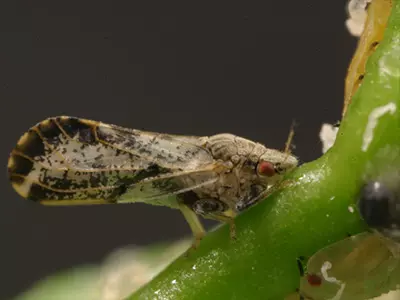Asian Citrus Psyllid

The California Department of Food and Agriculture (CDFA) has detected pockets of infestations of Asian citrus psyllid (ACP) in residential neighborhoods in Santa Clara County the past few years. To see a map of the current infestation sites, please visit CDFA’s website down below.
ACP is an invasive species of grave concern because it can carry the disease huanglongbing (HLB), also known as citrus greening. All citrus and closely related species are susceptible hosts for both the insect and the disease. There is no cure once a tree becomes infected with HLB, the diseased tree will decline in health and produce bitter, misshaped fruit until the tree dies. HLB has been detected in southern California.
This insect and disease endangers not only our commercial citrus industry, but also our backyard gardens. If ACP spreads all across California, an introduction of HLB anywhere can spread like wildfire and we will no longer be able to have citrus in our backyard gardens.
Where is HLB?
HLB is present in Mexico, several southern California counties, and in parts of the southern U.S. Florida first detected ACP in 1998 and HLB disease in 2005, and the two have now been detected in all 30 citrus-producing counties in that state. The University of Florida estimates the disease has tallied more than 6,600 lost jobs, $1.3 billion in lost revenue to growers and $3.6 billion in lost economic activity.
What is the State doing about this infestation?
Treatment activities will be carried out on all citrus plants surrounding the sites where the insects were trapped. Residents in the treatment area will be notified in advance of any activity. In addition to the treatments, the State is also releasing thousands of parasitic wasps to help control the spread of ACP. These wasps are completely safe to humans because they are too tiny to sting us or our pets. These wasps sting the eggs of ACP to parasitize them.
What can you do to help?
ACP and HLB can be carried into California on citrus plants, cuttings, or fruit. Please do not accept any tree cuttings or plants from an uncertified source. The best way to carry ACP or HLB into California is by taking a cutting or plant from a friend that has an infected tree and doesn’t know it yet!
You can also help out by saying “yes” to a trap in your yard if the State Department of Food and Agriculture asks to hang one on your property. It’s due to the great cooperation of residents in the San Jose and Milpitas areas that we were able to detect this invasive pest early and control it before it spread!
Residents in the area who think they may have seen the pest are urged to call the Pest Hotline at 1-800-491-1899. For more information on the Asian citrus psyllid and huanglongbing disease, please visit the California Department of Food and Agriculture’s website in the link below: